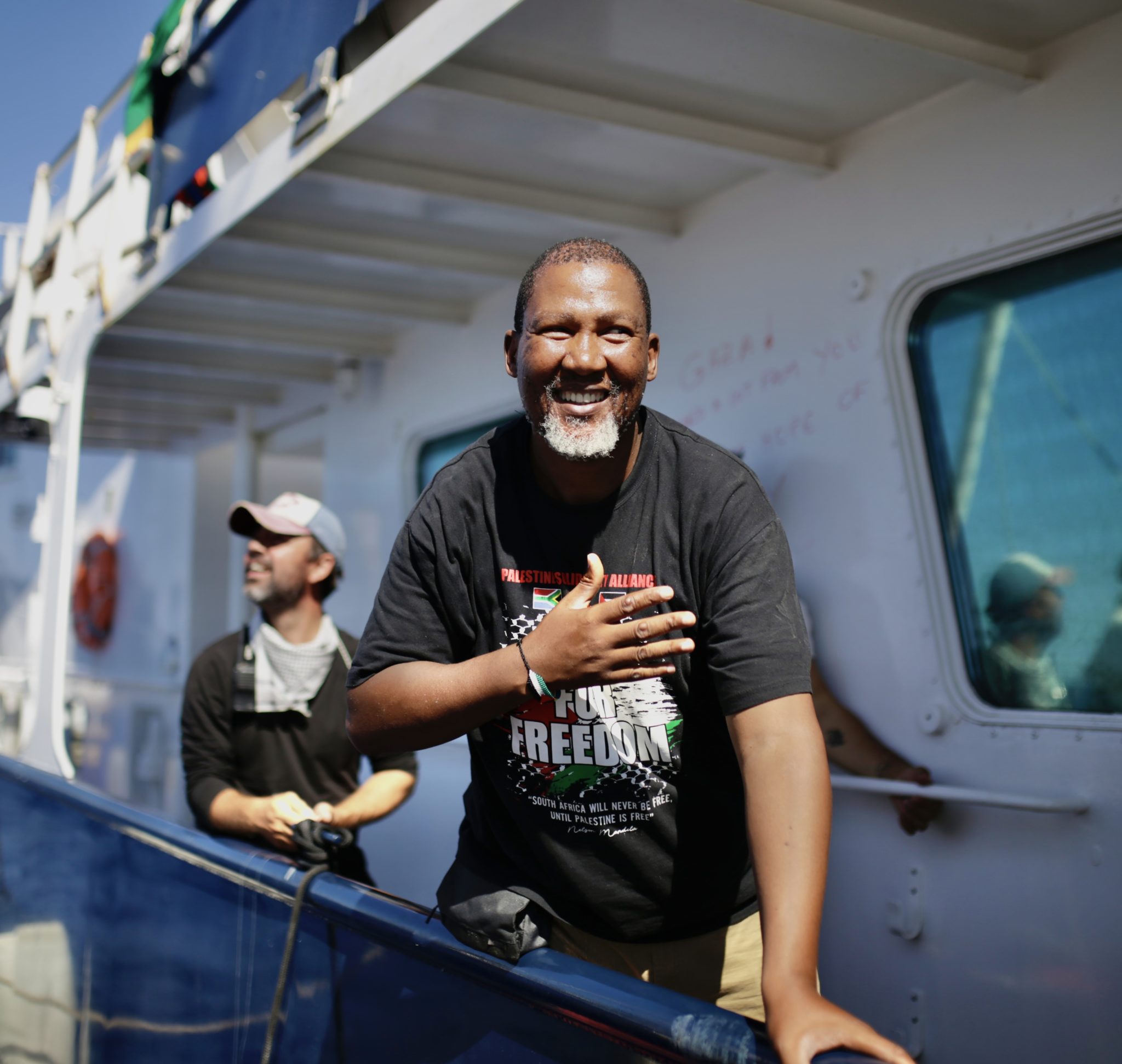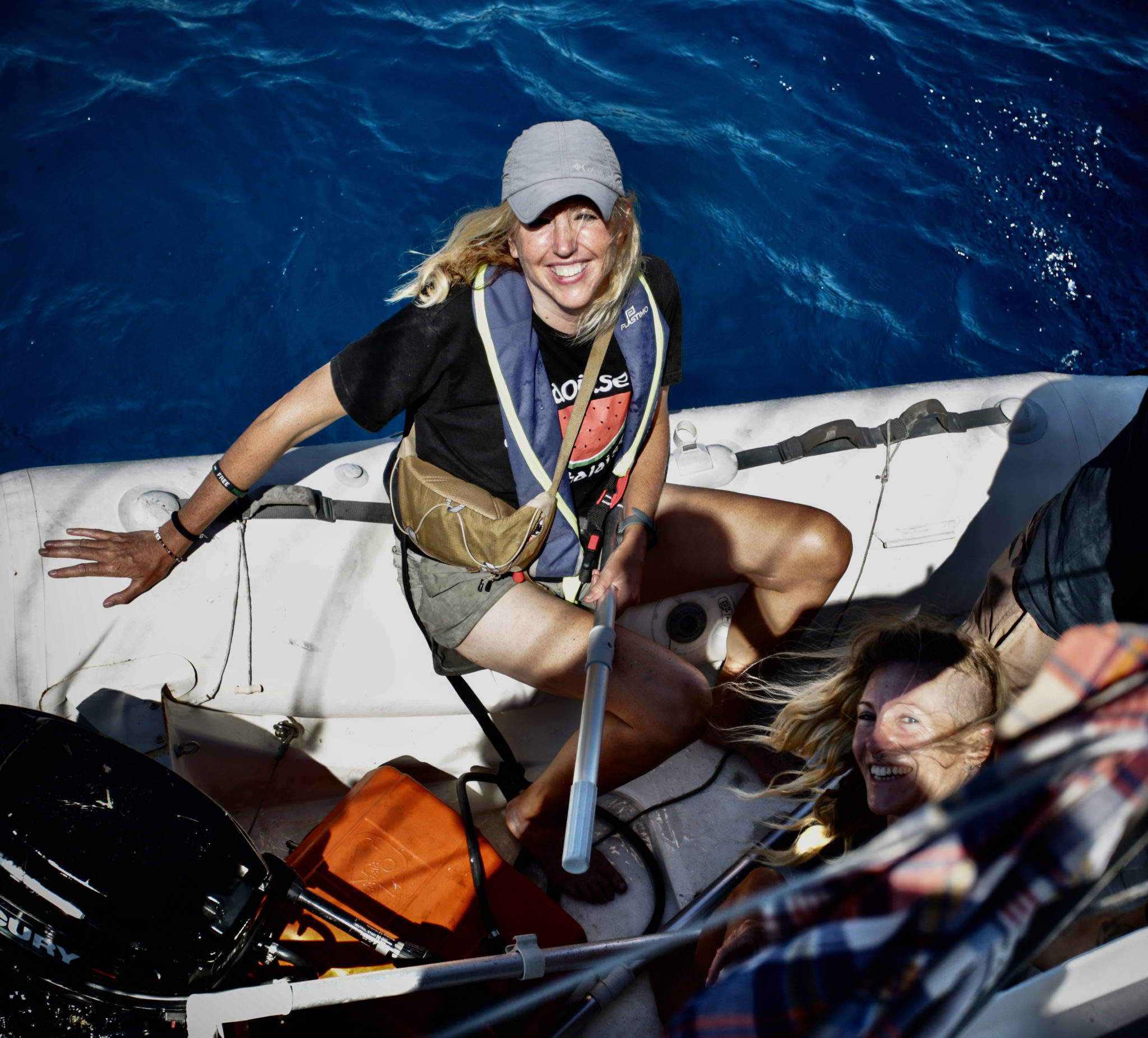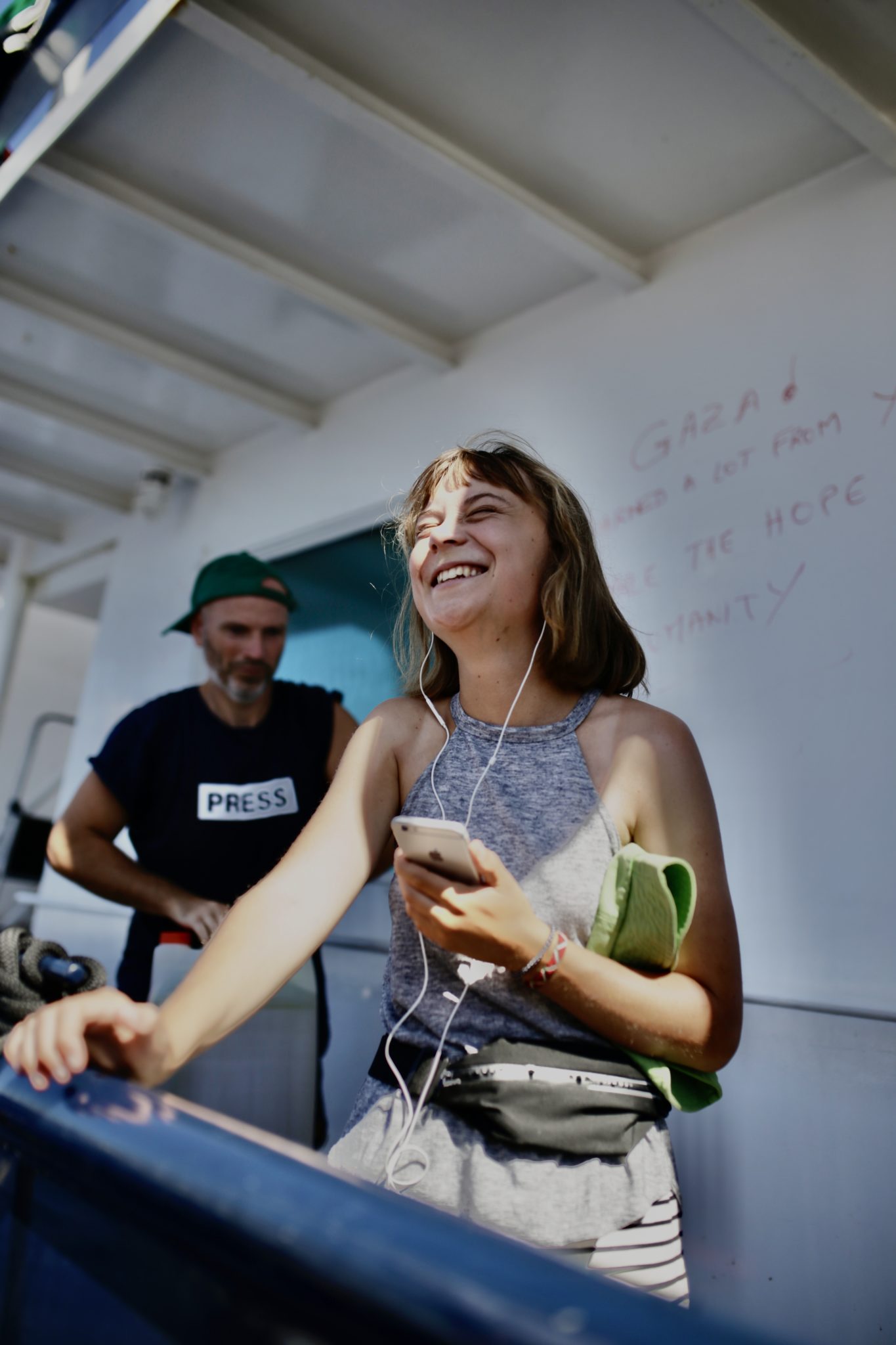- Opinion
- 28 Oct 25
Global Sumud Flotilla: "The flotillas reminded us all that the only sane response to a dystopian world is to have radical imagination"

Caoimhe Butterly is an Irish activist, family therapist and healthcare worker. She sailed on the recent Sumud Flotilla with the Alma and Irish Legal Support Boat, the Shireen. She has been involved in flotillas to Gaza since 2008.
At sunrise in Gaza, fifteen years ago, a group of fishermen prepared their nets to set sail. Restricted to six nautical miles from shore by the recently imposed and illegal Israeli naval blockade, members of the Abu Bakr family, a fisherfolk clan from Al Shaati refugee camp, spoke of the sea as giver and taker of life.
It was weeks after the Cast Lead bombardment had stopped, a brief pause post massacre. We had accompanied Gazan ambulance services, working alongside committed and courageous paramedics as they responded to the devastation. A small, disparate group of international volunteers, trying to act as humble, hoped-for deterrence to the systematic targeting of Palestinian healthcare workers and bombing of ambulances.
As we left port, Vittorio Arrigoni, months before his own violent death, Italian volunteer and soul friend, exhaled some of the grief we all carried- the weight of witness of intergenerational slaughter, entire families removed from Gaza's civil registry.
After airstrikes and drone attacks, we had worked with First Responders, lifting the bodies of the children out of the rubble first, often easier to locate, coloured hair-clasps or rainbow sweaters evident amidst the debris, their still faces covered with dust, mud matted in their hair, fragile limbs twisted into unnatural positions. Each small body, an indictment of a world that had failed them.
Sleepless Nights
In the fishing trawler that morning, sailing parallel to the exclusion zone, Mahmoud, one of the Abu Bakr brothers, put his arm around Vittorio's shoulder and commented that the sea was the only place he felt free - where he could forget the suffocation of the siege.
Four years later, in 2014, four of the young sons of the Abu Bakr fishermen were killed while playing football on the beach near their fathers' & uncles' fishing boats- one of them was Mahmoud's little boy. A photo taken seconds before they are shelled by the Israeli navy shows their small silhouettes running, arms and legs outstretched, desperately trying to reach safety. Seconds later, shrapnel pierces their 9 and 10 year old bodies- their vulnerable abdomens and chest cavities torn open. Their 11 year old cousin Moatasir survives, wounded and immobilised amongst the bodies of his cousins.
A year later, his mother is interviewed by a human rights organisation as she describes his sleepless nights, social withdrawal and dissociative grief as Gaza continues to be sporadically bombed. No P to the PTSD, no meaning in massacre in their small home close to the beach where he no longer plays football.
Gaza As A Mirror
On August 31 of this year, when the Global Sumud Flotilla set sail from Barcelona, a Spanish actor described Gaza as holding up a mirror to the world. A mirror in which two years of live streamed genocide and the spectrum of global response- from institutional enabling to collective grief and dissent- is seen.
Amongst the almost 500 participants on the vessels around us, some speak of Gaza as a lighthouse- as a call to our collective humanity.
There are people from over 44 countries and a myriad of backgrounds on board- a crew member who is a mother of six children; an Irish grandfather captain who says he can't bear to see one more photo of a massacred Palestinian child without taking action; a French doctor who has done prolonged hunger strikes in the name of Doctor Hussam Abu Safiyeh and other imprisoned Palestinian healthcare worker colleagues.
As we sail towards Tunisia, then Sicily, the over 40 boat communities consolidate amidst logistical challenges, overwhelmed organisers and broken down vessels. Conflict and humour emerge, people rupture and repair and learn to live with- and often love- each other in the contracted spaces of small sailboats.
Those on board- dockworkers, students, humanitarians, educators, medics, activists, artists, musicians, carpenters, farmers, trade union organisers, therapists, journalists, legal observers, marine biologists, parliamentarians, filmmakers, US military veterans, social workers- share ship tasks and build consensus, barter coffee and tobacco and learn to adjust to the ebb and flow of the sea. Mediterranean sunrises and sunsets bathe the flotilla formation in beauty- sails and flags unfurled, the faces of participants illuminated, a shared sense of unity deepening mile after nautical mile.
For those of us who have been involved longer term in the flotillas, we oscillate between hope and foreboding. The memories of 2010, when 10 Turkish participants were killed by Israeli commandos- including a 19 year old Turkish-American citizen, Furkan Doğan, shot at close range on deck- resurface and the drone attacks on the Family and Alma ships, and later on 11 smaller sailboats off the coast of Crete, feel like a portend of what might come to pass again.
We sail through some of the same Mediterranean waters where over 30,000 refuge-seeking women, men and children have died preventable, invisibilised deaths- part of the violent necropolitic of EU migration policies & externalised borders. We do watches at night under celestial skies, followed by Frontex and other surveillance drones. We're also, however, accompanied by Ani and old Search and Rescue comrades on the Emergency medical ship- whose life-saving SAR work is an attempted antidote to a context where the most basic of refugee and asylum seeker rights are negated.
As the journey progresses, we pivot between the videos of grief and trauma from Gaza on our phones; the cascade of WhatsApp updates of which of our friends- and their families- or paramedic colleagues have been most recently killed; and the faces of those around us at sea- the courage and care evident in each story of what brought them here.
 GSF Crew Nkosi Zwelivelile 'Mandla' Mandela and Semih Fener. Carlos Pérez Osorio.
GSF Crew Nkosi Zwelivelile 'Mandla' Mandela and Semih Fener. Carlos Pérez Osorio.Breath and Suffocation
Luna and Manuela, young indigenous activists from Colombia wave at us all as they sail past, arms around each others waists on the Hio; Samuel, an 18 year old home-schooled, Catholic Worker farm-raised volunteer, sings with the choir of 7 languages on board the Syrius, a 100 year old tall mast sailship with Search and Rescue captain Simón at the helm and Sofi as crew & psychosocial resourcer.
Lorenzo types his compelling missives of ship life and the idiosyncratic characters who populate it for Il Manifesto; Rana, diaspora Palestinian artist, trauma worker and Handala ship-mate educates all with her joy and resolve on the Huga; another comrade sails part-way, last seen when we were both teenagers on the long Zapatista March of the Colour Earth from Chiapas to Mexico City, while Ipshita and her crew on the Paola share folk songs about people power and applaud the setting sun each evening.
Ewa and Meriem from the All In offer wise humour and hugs; friends on the Yulara & Ohwayla vessels send poetry about collective liberation; human rights lawyers on board the Shireen work to frame this civilian mission within International Humanitarian & Maritime law; Nkosi Mandla, Nelson Mandela's grandson, and Semih mediate, anchor and steady other activists on the Alma (Soul of our Souls).
From land, Palestinian psychiatrist and community worker Samah Jabr writes to us all, describing the flotilla as an act of political resistance, but also as "balm for the wounded soul, a breath of fresh air in suffocation".
We read and inhale and exhale with her- nafas.
Shireen- daughter of Palestine
Some participants become ill and we row our dinghy into a Mediterranean island beach at midnight, our way illuminated by head torches, to quietly evacuate them to shore and a waiting local support group. Hugs and thank yous in a multitude of languages are exchanged before we row back to set sail to rejoin the flotilla before dawn.
Ships named after Palestinian assassinated journalists Anas Al Sharif and Shireen Abu Akleh- brave, beloved daughter of Palestine and friend, killed on the same street in Jenin refugee camp where I had been shot, post massacre, 21 years before- and other deceased comrades move in formation. Amongst them those of the Greek delegation- the Pavlos Fyssas named after the slain anti-fascist rapper and also Vangellis Pissias, an Alexandria-raised, Arabic speaking professor who fought against the Greek military junta in the 70s and sailed with us on early Free Gaza Movement and Freedom Flotilla Coalition missions that made it to Gazan shores- to the many waiting there to welcome the vessels in 2008 and 2009.
As we sail past Crete, then Cyprus, Gaza seems ever closer, more real. Even to those of us who have lived or spent time there, for whom memories of the rhythm of everyday life- of friends, the land, the collective heartbeat of a people who refused to be defined by their oppression- are not fully eclipsed by the horror of the videos absorbed through our phones over the past two years- Gaza feels more real.
Beyond the immediacy of life on the boats, the geo-political context evolves around us. Naval and Coast Guard temporary accompaniment, catalysed by advocacy, trade union organising and mass mobilisation in Italy and Spain, then Greece and Turkey, demonstrates the cracks in political systems, the glimpses of potential paradigm shifts, galvanised from the streets up.
The mobilisations escalate when the attack and illegal interception of the flotilla eventually begins, translating into global strikes and mass demonstrations, including by tens of thousands of high school students who leave classes to participate. They talk about the killing of children in Gaza and demand sanctions.
 Global Sumud Flotilla Crew Caoimhe Butterly and Morana Miljanovic.
Global Sumud Flotilla Crew Caoimhe Butterly and Morana Miljanovic.Photo: Carlos Pérez Osorio
The Impact of Witness
The treatment of flotilla participants is violent and degrading, but all attest to knowing how much worse it is for Palestinian prisoners. The aggression and threats exist on a racialised spectrum from Global North to Global South, restrained by passport privilege for some flotilla participants, but still real enough that it impacts, physically and psychologically.
A close friend, witness to the killing of US-Turkish human rights activist, Ayşenur Eygi, shot in an olive grove in a village in the West Bank, relativises his experience of violence in flotilla detention- worse than other international volunteers- and downplays it.
We message days later and something has shifted. He refers to the unprocessed grief of the past years- the unshed tears. The moral injury that accompanies witness. How could it not impact, not fragment parts of our collective humanity- genocide and all it's traumatic, devastating layers- infanticide, domicide, ecocide, scholasticide, urbicide. The attempted erasure of place and people. The feelings of collective shame and complicity when we can't stop it.
When everyone is en route home from prison, following the hundreds of flotilla deportations via Athens, Istanbul and Amman, scenes of the release of Palestinian prisoners flood social media. The same grey tracksuits and plastic sandals, but on the emaciated bodies of mainly men- fathers and sons, uncles and cousins, friends and colleagues- some broken by months, years or decades of torture, hunger, medical negligence, sexual violence, sensory deprivation and daily humiliations.
Many return home to Gaza to the devastating news of massacred families. One, Haithem Salem, rocks back and forth in shock as he learns that his wife and three children, 8, 5 and 2 years old, have been killed during his abduction. When interviewed later, he says that the last time he saw his wife was on their wedding anniversary, as they tried to flee South before he was separated from her and the children at an Israeli checkpoint. He said they made eye contact before he was taken away at gunpoint, knowing that they were 'losing each other'. He speaks about torture and survival in prison, of the sociopathic abuse, of not seeing the sun, "not even the moon" for 5 months.
He holds out a bracelet, made in prison for his 5-year old daughter Iman, and says without her, without them all, he has nothing left to live for.
If it is this suffering that the flotilla provided even a symbolic bridge into- insufficient, predicated by privilege, fleeting global insight- it had impacts. Somehow, unintentionally, the abuse of Greta- with her integrity, empathy and courage- and other activists, acted as a conduit into broader global understanding of the systemic abuse of Palestinian prisoners- women, men and children. Prisoners for whom there are no embassies to mediate release, no public validation of the harm they survive.
 GSF Volunteers Greta Thunberg and Tadhg Hickey. Photo: Carlos Pérez Osorio.
GSF Volunteers Greta Thunberg and Tadhg Hickey. Photo: Carlos Pérez Osorio.In the face of ethnic cleansing, occupation and hermetic siege, it seems then that the only counter to the dehumanisation of Palestinian life- and love of their children and each other- is to commit to assuming even a small part of the risks they face, daily, in their struggle to exist, their struggle to live lives far beyond survival.
As part of that, although opening a people's humanitarian sea corridor to Gaza two months ago- and 17 years ago- seemed impossible, the flotillas reminded us all that the only sane response to a dystopian world is to have radical imagination. Imagination through which the inevitability of Palestinian freedom continues to be held as lighthouse within the storms of injustice.
And until then, while governments and global institutions continue to fail, the people will continue to sail.
RELATED

- Pics & Vids
- 18 Aug 21
Filmmaker Fellipe Lopes on the "time-bomb" Refugee Camps on Lesvos

- Opinion
- 13 May 21
Life and Death in Gaza

- Opinion
- 08 May 20
Breathe: This One Precious Life

- Opinion
- 27 Jan 26






